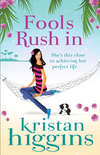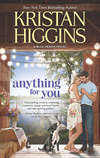Kitabı oku: «Fools Rush In»
I’m a stalker. The good kind…
We’ve all done things we aren’t proud of, haven’t we? Things we don’t want to confess to friends or parents or children. My obsession with Joe Carpenter was one of those things. It was bad enough to have been secretly in love with a man for more than half my life, but resorting to stalking at twenty-nine and a half was really embarrassing. Still, one does what one must.
Millie Barnes has concocted a foolproof plan for winning the man of her dreams. Or is she just a fool in love?
Fools Rush In
Kristan Higgins

To Ed Higgins, a great storyteller and great father
who loved Cape Cod above all other places.
Thanks, Dad.
Acknowledgments
Without my agents, Maria Carvainis, Donna Bagdasarian and Moira Sullivan, being published would remain an elusive dream, like donating a kidney to Bruce Springsteen or cooking Thanksgiving dinner. I am endlessly grateful for their excellent representation.
Deepest thanks and appreciation to my editor, Abby Zidle, a funny, kind and wicked smart person whose suggestions and guidance made this a much better book.
The people of Cape Cod have always been gracious, welcoming and helpful, kindly overlooking my lifelong love of the New York Yankees. Thank you for making the Cape our second home.
Personal thanks to fellow writer Rose Morris for her immeasurably kind soul and helpful input; to Carolyn Wallach for unhesitating honesty and generous praise; to Heidi Gulbronson and Pam Boynton, brave enough to read the first draft and say nice things anyway; and to my wonderful family: Mom, Hilary, Mike and Jackie, my truest friends.
Fools Rush In
CONTENTS
Prologue
Chapter One
Chapter Two
Chapter Three
Chapter Four
Chapter Five
Chapter Six
Chapter Seven
Chapter Eight
Chapter Nine
Chapter Ten
Chapter Eleven
Chapter Twelve
Chapter Thirteen
Chapter Fourteen
Chapter Fifteen
Chapter Sixteen
Chapter Seventeen
Chapter Eighteen
Chapter Nineteen
Chapter Twenty
Chapter Twenty-One
Chapter Twenty-Two
Chapter Twenty-Three
Chapter Twenty-Four
Chapter Twenty-Five
Chapter Twenty-Six
Chapter Twenty-Seven
Chapter Twenty-Eight
Chapter Twenty-Nine
Chapter Thirty
Chapter Thirty-One
Chapter Thirty-Two
Chapter Thirty-Three
Chapter Thirty-Four
Chapter Thirty-Five
Epilogue
PROLOGUE
I’M A STALKER. THE GOOD KIND.
Well, I was a stalker. It’s been a while. Even so, it’s hard to admit that you’ve followed, eavesdropped, spied, lurked, skulked and bribed in the name of love. But I’ve done all of those things—rather well, I might add. Perhaps you know what I’m talking about. It doesn’t matter how old you are, what level of schooling you’ve had or where you live—stalking is innate to the female psyche. We’ve all been there.
In my case, I stalked Joe Carpenter from the age of fourteen and a half until I went away to college. I knew where my subject lived. I knew his middle name, his mother’s name, his sister’s name, his dog’s name. I knew what kind of truck he drove, his favorite color, the names of his past four girlfriends, his favorite beer, where he went to happy hour on Fridays, which songs he played on the jukebox. I knew where he worked, how he took his coffee and the grade he got in third-year Spanish. There wasn’t much I didn’t know about Joe Carpenter.
While I didn’t quite meet the legal definition of stalking, I did drive by Joe’s house once or twice. Maybe more. (It was more.) I’d been known to “run into” him, a calculated maneuver executed with military precision and made to look quite accidental. It took years of training to reach the level of “coincidence” I developed. I probably shouldn’t be proud of that. Still, a talent is a talent.
It started in freshman biology at Nauset High School in Eastham, Massachusetts. Joe’s seat was diagonally in front of mine, and in order to look at the blackboard, I had to look past Joe. And I couldn’t. Not many women could look past Joe, even when he was fourteen years old. Then I discovered that his locker was three down from mine, and the stalking began.
Joe might mention to a friend that he was going to the beach after school, and I’d show up, too, crouching illegally in the terns’ nesting area so as not to be discovered, watching Joe frolic with the in crowd. I’d see his mom’s car at the store as my dad drove me home and suddenly blurt the need for tampons, knowing that feminine hygiene products would ensure that my father remained in the parking lot. I’d skulk through the aisles, hoping for a glimpse of Joe Carpenter. I’d ride my bike around town looking for Joe, stopping once I saw him to check the air levels in my perfectly inflated tires, carefully not noticing him, simply lurking in his golden presence.
Joe became, ironically, a carpenter, known professionally as Joe Carpenter the Carpenter. Thanks to my years of research, I knew what others, too sidetracked by his beauty, might have missed—Joe was honest, humble, hardworking and sweet. He performed anonymous acts of kindness, took pride in his work and treated people with benevolence and good cheer. He even adopted a three-legged dog. And yes, Joe Carpenter was gorgeous.
He had the kind of looks that made breathing irrelevant. A smile from Joe could cause waitresses to drop coffee carafes, sending splinters of glass skittering across a restaurant while they stared dreamily at my subject. Cars had collided when he jogged across an intersection; rooms had fallen silent at his entrance. And God in heaven, if he took off his shirt when he was outside working…Tourists had been known to stop and photograph the beauty Joe provided. Forget Nauset Light, take a picture of that!
Not a woman alive could remain unaffected by Joe’s looks. Dark blond hair, streaked with lighter gold from his hours in the sun. Clean, strong bone structure. Pure green eyes framed by impossibly long, thick golden eyelashes. Dimples. A slightly lopsided, boyish smile. Perfect teeth. Of course, Joe knew he was beautiful—a person couldn’t look like that and not be aware of the effect he had on others. But he never flaunted it. Usually a little scruffy, he didn’t seem to care too much about his appearance. His hair was often tousled, as if recently from bed. He was frequently unshaven. Clothes rumpled. Effortlessly, magnificently appealing.
Joe and I were both native Cape Codders, both in the same school year. We weren’t friends, though we might have said hello to each other a few times in high school. (It was three times, and these slight acknowledgments in front of our peers caused bursts of giddy joy and acne as my hormones surged with the thrill.)
And then came The Time—the monumental event that ensured Joe’s status in my heart forever more.
In sophomore year of high school, our class made the trip to Plymouth Plantation required of all New England schoolchildren, by civic pride if not by law. With the curious mix of ennui and exuberance typical of fifteen-year-olds, we spent an hour on our rattling, fume-ridden bus before slouching through the streets of the historic village. Despite the fact that my peers were sullen and bored, I couldn’t help but be charmed by “Obadiah,” the period-garbed man who was roasting bluefish over an open fire. He offered me a taste. I accepted. He gave me another. I ate that one, too, delighted at his interest in me, ignoring the fact that he made his living by schmoozing tourists.
On the bus home, as kids tossed wads of paper back and forth, shrieking like enraged chimpanzees, that bluefish made itself known to me. My best friend, Katie, asked me if I was okay; apparently, I was more than a little green. I answered by throwing up on my shoes. Ah, bluefish. I’ve never been able to eat it since.
At any rate, the kids around me reacted with all the kindness you’d expect from teenagers—that is to say, none. I gagged a few more times to the taunts and disgusted cries of my peers as Katie went to the bus driver for paper towels. My eyes were tearing in the aftermath of vomiting, my nose prickling, face flaming. And then…and then Joe was sitting next to me.
“You okay, Millie?” he asked, pushing his hair off his forehead.
“Yes,” I whispered, horrified, thrilled, nauseous and smitten.
“Shut up, guys,” Joe instructed affably, and because he was Joe, they listened. He patted my shoulder, and even in my weakened state, I registered every detail—the warmth of his hand, the kindness in his beautiful eyes, the half smile on his perfect lips. Then Katie arrived with paper towels and kitty litter to absorb the mess, and Joe returned to the back of the bus where the cool kids sat.
Proof! Proof that Joe was more than just a pretty face. College and even medical school didn’t help me outgrow my obsession; instead, I’d come home on break and pick up where I left off—find Joe. Run into Joe. Speak to Joe. Sure, I’d feel slightly ridiculous…until I caught a glimpse of him, when all embarrassment would evaporate in a cloud of love. He always had the same effect on me, his casual “Hey, Millie, how are you?” sending tremors through my limbs, heat to my face.
Now, at nearly thirty, I was still doing a pretty good imitation of teenage obsession. With my residency finally over, I had just moved back to the Cape, and here I was, in agonizingly close vicinity to Joe again. But this year would be different, I vowed. This was the year I would become Joe-worthy.
I didn’t have any illusions about myself. I was a smart, nice person. Funny. Caring. A fine friend. Though I was still pretty new to the profession, I knew I was a good doctor. But in terms of physicality, I was short, chubby, with long, lank hair that I pulled into a ponytail more often than not. Straight enough teeth. Brown eyes. Overall, rather plain and ordinary. Being cursed with an extremely beautiful older sister had certainly not helped my self-image over the years. Nor had my residency improved on what nature had given me, though I had definitely mastered the pasty skin/dark circles/unshaven legs look.
In order to attract the attention of a man who embodied physical perfection, I knew I had to make the most of what I had. While I didn’t imagine that I could become a swan, I was determined to become at least, oh, I don’t know, a Canada goose? They’re nice, right? Nothing wrong with a Canada goose.
My plan was simple, much like those of countless women who had set out to get their men. I would get a good haircut and makeover and shed the excess weight that gave me the Pillsbury Doughboy figure I now sported. I would buy a new wardrobe with the help of better-dressed friends. I would get a dog, as Joe was a dog lover, and become a better cook. And once I’d done these things, I would insert my newly forged presence into Joe’s life and make my move.
CHAPTER ONE
ON THE FIRST MORNING in my new home, I awoke to the sharp, hopeful smell of fresh paint, the radiator ticking companionably against the cold March day.
Today held all the unsullied promise of a new school year. Residency finished. Home remodeled. Career soon to begin. And Joe…Joe was out there this cold morning, soon to find that I was the love of his life. Swinging out of bed, I looked around the room, noting with pride the bright, clean blue walls and antique quilt. I padded barefoot to the kitchen, admiring my gleaming counters and shining porcelain sink. Turning on the coffeemaker, I breathed a deep sigh of happiness and gratitude.
As the coffee brewed, I rummaged through a box that was yet unpacked. Finding what I was looking for, I returned to the kitchen as the coffeemaker emitted its last gurgles, poured myself a cup, sat down and turned my full attention to the object before me.
An eight-by-ten photograph showed Joe Carpenter standing silhouetted against the sky, shirtless, as he nailed a shingle on a roof. The crispness of the black-and-white photo showcased his perfectly muscled arms as he performed this seemingly mundane task, which, with Joe’s easy grace, became poetry. He was slightly turned away from the camera, but enough of his face showed that you could see just how beautiful he was. The caption had read Aptly named Joe Carpenter of Eastham works on the restoration of Penniman House.
How did I get this picture? I’d called the paper and asked for it, thank you very much. It had been in the Boston Globe, and they’d never suspected that I wasn’t Joe’s mother, as I’d claimed to be. Sometimes having an old lady’s name comes in handy. After all, they wouldn’t have believed me if my name had been Heather or Tiffany…. Of course, I couldn’t keep this picture out in the open, so I secreted it away for special times. Now was such a time, and I gazed at it with the reverence it deserved.
“It all starts today, Joe,” I said, feeling pretty idiotic. Still, as I traced the outline of the man I’d loved for so long, the foolish feeling dissipated like early morning fog. “You’re about to fall in love with me. Everything from here on is for you.”
Resisting the urge to kiss the photo, I got up and strolled around my little house, cup in hand, basking in the thrill of simply being here. Home ownership on Cape Cod is a monumental achievement…one that I’d accomplished through no effort of my own. My grandmother had died just after Christmas. When the will had been read, I’d learned, with great shock and unsquelchable joy, that she had left her house to me—and only me.
The modest little ranch wore the requisite cedar shingles of the Cape, bleached a soft gray by the salt air and sun. There was no yard to speak of, just a scattering of pine needles, sand and moss. But the house was priceless because it was on protected land of the Cape Cod National Seashore. This meant that it would forever be free from development, I would never have a new neighbor, and I was pretty close to the water (three-tenths of a mile to be precise, though there was no view whatsoever). But I could hear the roaring surf of the mighty Atlantic, and at night the beam of Nauset Light swept across the darkness.
For months, I’d been driving up from Boston to work on the house, sanding floors, painting walls, sorting through my grandmother’s things, and the end result was a nice amalgamation of old and new. Gran’s needlepointed footstool sat next to my glass coffee table, bright new fabric covering her old beige love seat, a nice watercolor in the spot where a photo of John Kennedy at prayer had once hung. I considered the warm yellow I’d chosen for one wall of the living room, decided it was indeed fantastic, and walked into the bathroom to check on the pink flamingos my mother and I had stenciled on the pale green walls. Wait till Joe sees it here, I fantasized…he’ll never want to leave. I stuck my head in the bathroom vanity to assess how much space I had. The small area still smelled pleasantly of lemon Pine-Sol, the fumes making for a rather pleasant buzz.
The phone rang and I jumped, whacking my head on the cabinet. I ran to the kitchen to answer my first phone call in the new house.
“Hi, Millie, hon,” my mom said. “How was the first night? Everything okay?”
“Hi, Mom,” I answered happily, rubbing my scalp. “Everything’s great. How are you?”
“Oh…fine,” she answered unconvincingly.
“What’s up?”
“Well…it’s Trish,” Mom murmured.
“Ah.” Of course it was Trish, the usual topic of family conversation. “So what’s going on?” I opened the fridge and eyed the few occupants: oranges, half-and-half and, purchased in a moment of self-delusion regarding my baking ambitions, yeast. Clearly, I would have to hit the market later on. “Is Trish visiting?”
“No, no, she’s still in…New Jersey. But the divorce is final today. Sam just called us.”
“I’m sorry,” I said. And I was. My parents adored Sam Nickerson, my brother-in-law. As did I. As did the rest of this town. Sam was the son my parents never had. He and my father often watched football games together and did manly things like dump runs and driveway patching. My mother loved nothing more than feeding him and my much-beloved seventeen-year-old nephew. “Well, it’s not like we’ll never see Sam or Danny again,” I assured my mom. “They’re staying put, at any rate.”
“Oh, I know,” she answered. “I just wish…I wish your sister had taken more time. I think she’s making a mistake.”
A sweet, guilty pleasure rushed through me at my mom’s disapproval. Trish had always been Mom’s favorite, and for years Mom had turned a blind eye toward my sister’s behavior, always putting a positive spin on her selfishness. Even when Trish had gotten pregnant just after high school, my mother had defended her, taking comfort in the fact that Sam had immediately married Trish and taken her out to Notre Dame, where he’d been on an athletic scholarship.
I reminded myself that I should be over this sort of thing. Still, I couldn’t help saying, “Well, of course she’s making a mistake.” Closing the refrigerator, I asked, “How are Sam and Danny?”
“They’re all right. Sam seemed very sad, though.”
“I’ll go visit them later,” I offered.
“That would be nice, honey. Oh, Daddy wants to talk to you. Howard, it’s Millie.”
“I know who it is,” my father said. “I’m going to the plumbing supply store, punkin. Anything you need?”
“No, thanks, Daddy. I’m all set for now.”
“Well, I need some pipe. The Franklins’ septic system overflowed last night and their yard’s a mess. I told them Scott tissue only, but who listens, right?”
“Serves them right, then. I don’t think I need anything, but thanks, Dad.”
“Okay, baby. Bye-bye.”
“Bye. Have fun with the cesspool!” I answered, knowing he would. My father owned Sea Breeze: The Freshest Name in the Business, a robust septic service company, and he loved his job with the kind of zeal usually displayed only by missionaries or NFL cheerleaders.
Pleased with the sense of familial closeness, I hung up the phone. Then, with great moral fortitude, I readied myself for the next step of my plan to win Joe Carpenter.
As a medical doctor, I obviously knew that there is only one way to lose weight, and that is to burn more calories than are consumed. I’d put myself on prison rations, hence the dearth of anything good to eat in my house. My self-control lacked gusto. If I bought Ben & Jerry’s Heath Bar Crunch, arguably the finest ice cream on earth, I would eat the entire pint in one sitting. With this fresh start of mine, I had resolved to improve my eating habits, and therefore I hadn’t bought anything fattening or sugary or buttery—in other words, anything good. To facilitate the weight-loss process, to enter the golden realm of the physically buff, I had also decided to start running.
Running, I surmised, was easy. Just put on sneakers and go, right? Very little skill required in running. I had all I needed. Running bra, check. Nikes, check. Black running shorts, check. Not the spandex kind. Dear God, no! These were a nice, loose, breathable fabric. Cute T-shirt, check. This one said Tony Blair Is a Hottie. Gaze upon Joe’s picture, check. Sigh dreamily, check. And out the door I went.
I’d never really exercised before. At all. Oh, I played a little softball as a kid, as it was something of a religion around here, but I never did aerobics or Jazzercise or Pilates, as did, say, sister Trish. And the difference showed. Trish, who was thirty-five, looked about twenty-three, with toned, tanned arms, tiny waist, firm bottom. As an adult, I had been too engrossed in college, med school, etc., to spend any time on my physical well-being. Residents are notoriously unhealthy. We eat Twinkies and call it a meal. Sleep for four hours and call it a night. Exercise? That’s something we advise for our cardiac patients. It’s not for us, silly.
After a minute or two of vague stretches, I walked down my long dirt driveway and onto the road. Since the Cape was pretty deserted in March, I was fairly sure I’d be safe from unwanted spectators. It was overcast and cool, a good day for running, I thought. Off I went. Trot, trot, trot. Not bad. Easy, in fact. Mercifully, no coordination was required. Trot, trot, trot. It was pretty cold, and my bare legs and arms stung in the damp, raw air. I passed my neighbor’s driveway and continued down the road, finding that I had to breathe through my mouth now. My stomach jiggled. I wondered how far I’d gone and glanced at my watch. Four minutes.
I tried to distract myself, get into the zone, by looking around at the pretty sights. Twisted locust branches clacked together in the salty breeze. I came up to the lighthouse, its bright red-and-white tower starkly beautiful against the gray sky. Ouch! A sharp pain lanced through my left side. Run through the pain, Millie, I coached myself. Pain is weakness leaving the body. My feet slapped the pavement. Nine minutes now. The cold air scraped my throat, and I was not encouraged to hear my lungs convulsively sucking air. Agonist breathing, we call it on the hospice ward. Had I run a mile yet? Was I doing something wrong? Was my oxygen saturation dangerously low?
I lurched to a stop, bending over and wheezing pitifully. Just taking a breather, I consoled myself as my heart thundered sickeningly in my head. After a couple of minutes, I regained my composure. Off I went again. Immediately, the wheezing was back. I tried to concentrate on breathing…how hard could it be? In, out, in, out, in, out, oh Jesus, I was hyperventilating! And now I could hear a car! I feigned athleticism and forced myself to lengthen my stride in case it was someone I knew. Smiling through the incredible pain, I waved, which caused my shoulder to spasm and cramp. The car passed. Crisis over.
No, not over. A hill loomed ahead. Keep the feet slapping, Millie. Don’t stop now. This hill didn’t look like a hill to the naked eye; it was more of a grade, really, but as far as I was concerned it was Heartbreak Hill. I imagined myself in the Boston Marathon, that pinnacle of all athletic events, often imitated, never duplicated…and here comes Millie Barnes, that’s Dr. Millie Barnes, ladies and gentlemen, from beautiful Cape Cod—
Was I about to lose control of my bladder? And/or throw up? My watch said thirteen minutes. Clearly, it was broken. At the top of Heartbreak Hill, I turned around and started back. Ah, this was easier, except that I was hyperventilating again. Calm yourself! I commanded. The hill, so horrifically long on the way up, was far too short on the way down. My legs were as supple as oak beams, and my shins practically mewled in agony. The pain in my side had yet to go away, and my shoulder cramp had now spread to my neck, forcing me to tip my head at an awkward angle.
The lactic acid in my body was building up to toxic levels. I imagined them diagnosing me at the ER in Hyannis. “Christ, what happened to her?”
“She was running, Doctor.”
“How far?”
“Almost a mile, Doctor.”
Damn it! If I stopped now, I knew I would never again attempt this stunning torture. Think of Joe, I ordered my brain, think of being naked with Joe and having a fabulous body. “Oh, Millie, you’re in such great shape,” Joe will sigh reverently as he gazes upon my…my…my neighbor’s mailbox! I was almost home! And yes, there it was, home sweet home, my own beloved washed-out driveway! I staggered into it and careened to a stop. Knees buckling, legs shaking uncontrollably, T-shirt soaked, throat dry and rasping, fighting off the dry heaves, I wobbled drunkenly into my house and collapsed into a kitchen chair.
Here she is, ladies and gentlemen! Dr. Millie Barnes, winner of the Boston Marathon! I looked at my watch again. Twenty-eight minutes, 1.7 miles. That was awesome! I had done it. My convulsive gasping took a while to stop, but after all, what a workout! After twenty minutes or so, I heaved myself out of the chair and downed a glass of water.
Then I made the large mistake of looking in the full-length mirror. My face was a shocking shade of red. Not pink, not flushed with the glow of a good workout, not even just red. A shocking shade of beet-red. The whole face, just one solid color. My eyes were puffy from sweat irritation, my lips chapped and flaky white, providing the only break from the Crayola crimson. My sweaty T-shirt clung to the doughy skin of my upper extremities and neck. My legs were red and wind-burned, better, I supposed, than the chalk that was my normal skin tone. Oh, well. I was a work in progress, after all.
I took a hot shower, forced out far too soon by the tiny water heater’s shortcomings. As I made myself a pot of greenish herbal tea, I decided to call my sister. After all, her marriage officially ended today, and I thought I should be, well, sisterly. Still…Trish scared me a little. I remembered her hissing fury when Gran’s will had been read. Trish had received several thousand dollars, a pittance compared to what this house was worth. That was the last time I’d seen her.
After a few minutes of sifting through papers on my desk, I found her number. The strange area code gave me a pang. She was pretty far from home, our Trish.
When I’d been in college, I’d called her fairly often for Danny updates, as I adored my nephew, but after he was six or seven, Trish would just put Danny himself on, knowing the true purpose of my call. Or I would talk to Sam, who would give me blow-by-blows of Danny’s Little League games, parent-teacher conferences, clarinet lessons, etc.
“Hello?” As always, she sounded impatient.
“Hi, Trish, it’s Millie,” I said, immediately uncomfortable.
“Oh, Millie. Hi,” she answered. “What’s the matter?” I could picture her fidgeting next to the phone, no doubt with many better things to do than talk to her younger sister.
“Nothing’s the matter,” I answered, pouring my bilious tea. The aroma of herbal sludge filled the room. “I, um, I heard your divorce was final today and I wanted to see how you were doing.”
There was a pause. I could sense her irritation coiling like a rattlesnake. “I’m fine,” she said briskly. “Never better.”
I gritted my teeth. Wishing I hadn’t called, I nevertheless forged on. “Well, you know, you were married for a long time, and I just thought…”
“Millie, I’m happier now than I’ve been in years. Just because you belong to the Sam Nickerson fan club doesn’t mean that we made each other happy, okay? This is what I want. Avery is what I want. Not Sam. Sam is boring.” There was no greater crime in my sister’s eyes than being boring.
“Right,” I answered. “It’s just that…I thought you might be down. Seventeen years and all. Thought you might be feeling a little melancholy, but I can see I was wrong.”
“That’s right.”
“Okay, Trish, great talking to you. Have fun in the Garden State.”
“How are you?” Trish asked unexpectedly.
“Me? I’m good. Great, in fact,” I answered, immediately assuaged by the unforeseen attention. Such was the plight of a younger sibling.
“How’s Gran’s house?” she asked with only a moderate amount of hostility.
“It’s getting there,” I answered. “Is there anything you want? Maybe an afghan?”
“God, no, Millie. Please.” We were back to normal.
“Well, I’m going over to see Danny later, and I’ll tell him you said hi,” I said, hoping to inspire some guilt. It didn’t work.
“I called him earlier. He’s coming to visit again next weekend.”
“Oh.” Our conversation was clearly over. We said our uncomfortable goodbyes and hung up.
Trish and I were as different as two who shared a gene pool could be. While I had battled crooked teeth and fat as a youth, Trish had floated through adolescence, untouched by eating disorders, pimples or bad hair choices. Trish had been captain of the cheerleading squad. I had been president of the science club. Trish had been prom queen. I’d taken honors biology. She’d dated the football hero. I’d dated not at all.
In order to dispel the feeling of incompetence and frustration my sister inspired, I next called Katie Williams. We’d been friends since kindergarten, when she’d thrown up on my desk, a bonding experience that has withstood the test of time. There’s something irreplaceable about a person who’s known you since you lost your first tooth, bought your first bra, had your first drink. Katie knew about my undying love for Joe, my plans, Trish, everything. Being the single mother of two little boys, she seemed to enjoy hearing about topics other than potty training and Bob the Builder. And of course, she got free medical care, courtesy of her sons’ godmother (that would be me). At any rate, Katie was my sounding board as I plotted, ranted, raved and fantasized about Joe Carpenter. She had always been extremely tolerant of this.
Katie listened with false compassion and far too many laughs to the account of my first athletic attempt, sympathized about my sister and agreed to come over for coffee the next day with my godsons. After we hung up, I got dressed, hooked up my CD player and danced around to U2, pretending to be Bono for two songs. Then I finally stopped stalling and got into my car. Time to go see Sam and Danny.
They lived on the other side of town in one of Eastham’s most picturesque neighborhoods. When my nephew was three or four years old, Sam’s parents had died in a car accident, the result of a drunken teenager smashing into them on Route 6. Trish, Sam and Danny had moved into Sam’s parents’ house three weeks after the funeral. My sister had begun remodeling immediately. A year later, the house was unrecognizable. They’d gutted it almost completely, and in its place now stood a modern, angular structure with huge windows facing the bay. Sam had taken a second job to help pay the bills.










